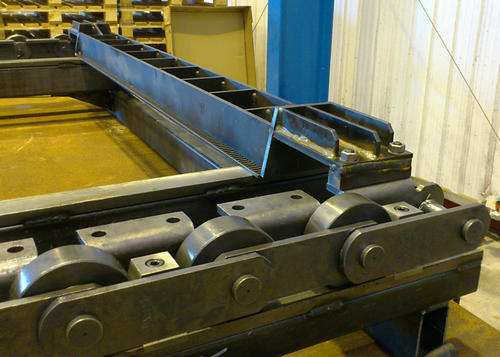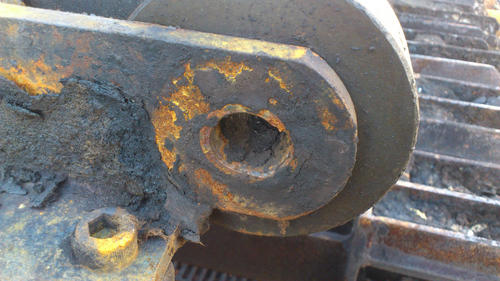Tsubaki expertise reduces downtime for insulation manufacturer
Maximising productivity and reducing costs means ensuring that equipment is correctly specified for the task and properly maintained while in service. For one manufacturer of glass fibre insulation, a conveyor system that passed through an oven was suffering from premature chain wear which was affecting product quality. Having approached Tsubaki for a longer lasting alternative, the chain manufacturer delivered a premium chain that would last three times longer and greatly reduce production downtime.

The proposed roller attachment chain, manufactured by Tsubaki, was equipped with some special features including hardened chromium-plated pins, Molybdenum disulphide (MoS2) lubrication that would provide high lubricity even beyond the temperatures experienced inside the oven.
Producing glass fibre insulation involves molten glass being poured into a perforated container that is rapidly rotating and discharging horizontal streams of glass, which are converted into fibers by a downward blast of air, or hot gas. The fibres fall onto a conveyor, where they interlace with each other in a fleecy mass. This is then sprayed with a binder and two conveyors compress the fibre mat into the desired thickness before entering the oven where the binding agent is cured.
The conveyors are constructed using heavy duty attachment chain, to which are fixed a number of cross-members, creating a platform that carries the glass fibre mat. Just before the mat enters the oven, a second conveyor converges with the first to compress the mat and hold it in position while travelling through the oven. Having cured the binding agent, the mat now has a uniform thickness and it can be cooled before being packaged ready for sale.
The original conveyor chain was suffering from elongation and roller wear which was caused by several factors: reduced lubrication of the chain resulting from the high operating temperature, difficulty in accessing the chain for required maintenance and the risk of excess lubricant contaminating the glass fibre mat. The elongation of the conveyor chain led to increased gaps between the cross-members which affected the quality of the finished product. As a result, the chain was only lasting for two years before it had to be replaced. In order to improve this situation, Tsubaki Europe was asked to assess the application and investigate the reasons for the premature wear. Clearly chain lubrication was an issue, but high oven temperatures and the proximity of the chain to the finished product would not make for an easy solution. The experience and expertise of the Tsubaki engineers, however, enabled them to propose a solution that would save the client considerable time and money.

The proposed roller attachment chain, manufactured by Tsubaki, was equipped with some special features including hardened chromium-plated pins, Molybdenum disulphide (MoS2) lubrication that would provide high lubricity even beyond the temperatures experienced inside the oven. Being a dry lubricant it also posed no risk of contaminating the glass fibre mat during the manufacturing process. To complement the chain, Tsubaki also supplied matching sprockets which feature induction hardened teeth and provided the most efficient power transfer to the new chain. By using high quality materials and specialist hardening techniques, any wear in the sprocket drive is kept to an absolute minimum.
As part of the project, Tsubaki engineers were also involved in the installation of the new chain to ensure the best possible chain alignment; therefore maximising the expected service life of the chain. Since its installation the chain has been shown to last for more than six years, at least three times as long as the previous chain. Overall, the cost savings for the client were considerable. During the chain replacement procedure, the machine would be out of production for three weeks and in the past the annual maintenance costs were €170,000, including costs associated with lost production. The new chain would still take 3 weeks to replace, but this operation would only happen every six years, providing an annual maintenance cost of €62,000. Over a six year period the client is expected to not only save nearly €650,000 but also gain 6 weeks of production time, which can make a significant contribution to the bottom line. In addition, the more consistent performance of the Tsubaki chain allows the client to maintain excellent product quality standards and keep to the planned maintenance programme.
